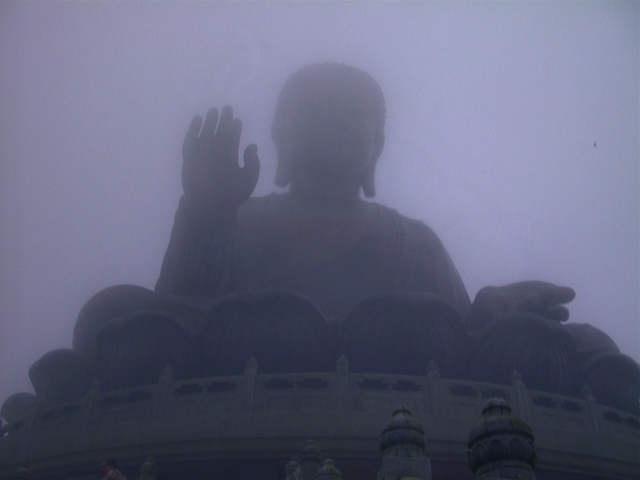BUDDHIST ENLIGHTENMENT

and the
INTERNET
PRESENTED BY:
the Wanderling

and the
INTERNET
PRESENTED BY:
the Wanderling
Although biologically people today are very similar to people at the time of the Buddha, modern communication devices that relay information instantaneously to us make modern society very different from that of the Buddha. Whereas in the past people around the world gradually heard the message of the Buddha mostly through the medium of small group discussion, today our lives are increasingly lived in terms of the new electronic communication devices rather than through interpersonal communication. The claim by Marshall McLuhan that the medium is the message raises the issue about how the Enlightenment of the Buddha relates to the information highway and to the new social reality shaped by this modern media.
SOLITARY ENLIGHTENMENT vs. MASS MEDIA Every October millions of people around the world enjoy watching baseball's World Series, while every December people around the world celebrate another event, the Enlightenment of the Buddha. While the World Series is a mass media event watched on television by millions of people and then read about and analyzed in newspapers and on the Internet, the Enlightenment of the Buddha happened alone and was reported to others for centuries only by word of mouth.
The strange thing is that in spite of all the press coverage of a given World Series, it is now old news--there are no more celebrations. But the achievement of Enlightenment by Sakyamuni Buddha that no one knew about when it was happening, and very few understood what happened even after learning about it, is being celebrated today all around the world. Does this mean that the new multimedia trivializes its subject in contrast to interpersonal communication so that people soon lose interest, or does the media do its job so well that it saturates its topic so that people need not return to the subject again? Or is the difference based upon the content of the message in spite of the different media?
INTERNET versus INTIMACY How did the Buddha communicate and what was his message? Certainly during the lifetime of the Buddha, the power of his personality seems to have played an important role, so that after meeting him and hearing his message, many people changed the direction of their whole lives. Since meeting the Buddha in the flesh is no longer an option, what about the message and medium used for later Buddhist followers? Although many changes have evolved in content and methods of Buddhism, two key elements have endured: the personal meeting between a teacher and student, and the practice of personal morality and meditation as a means to fully understand and embody Enlightenment.
Inherent in these two elements is a quality that is notably lacking in electronic communication, namely, intimacy. Robert Aitken, who is sometimes called the "dean" of American Zen masters, has often said that a key feature of Enlightenment is the increased capacity of people to be intimate with the varied phenomena of life at each moment. The interpersonal interaction between master and student emphasized in the Zen is necessary for the transmission of Enlightenment "mind to mind" or "heart to heart." Typically, for Zen students, this is then tested in the Dokusan encounter with their master. No electronic medium is adequate for this degree of intimacy.
However, although Zen is Buddhism, not all Buddhism is Zen. Zen is notorious for being "outside the Doctine," that is, not requiring all the traditional trappings. There is a big difference in the needs of Buddhism generally and that of Zen. Zen adherents that have a vested interest in guru-ships, Sanghas, need for followers and that sort of thing will take issue with the potential possibilites the Internet can provide seekers along the path. There are many numbers of those Enlightened without any formalities whatsoever, especially after some insight into the Dharma. Buddhism even has a word for those adepts: Pratyeka Buddha. In that light the Internet may be the perfect medium. See:
A CHILD OF THE CYBER-SANGHA
ENLIGHTENED INDIVIDUALS I'VE MET
THE AWAKENING EXPERIENCE IN THE MODERN ERA
So said, the unconventional wisdom of Buddhism and this sometimes "needed" face-to-face encounter, the degree of openness and intimacy needed to practice Enlightenment is unusually high, and may have been one of the reasons that the scriptures reported that the Buddha after his Enlightenment doubted if he had anything to say to people that they could receive and understand. However, the scriptures say that he was persuaded by the god Brahma that some people did have the capacity to hear his message and be helped. Accordingly, the Buddha began to teach others and to send out his disciples alone to do the same:
Go forth, monks, on your own way for the profit and happiness of the many, out of compassion for the world, for the profit, gain, and happiness of gods and people. Let no two go together.Teach, monks, the Teaching (dhamma) that is lovely in its beginning, lovely in its middle, lovely in its ending, in the spirit and in the letter, and propagate the perfectly pure holy life. There are beings whose eyes have little dust on them, who will perish if they do not hear the teaching. But if they hear the teaching, they will gain liberation.--Mahavagga of Vinaya 1.11.1
On teaching and Enlightenment, not unlike the Buddha experienced, the Venerable Ajarn Thoon Khippapanya writes of those Enlightened in his paper, The Post-Enlightenment Experience:
Soon after the last thought, another thought comes to the mind. This thought concerns reluctance to teach this knowledge to others. You think the knowledge that you have discovered is so refined and so profound that ordinary people will find it too difficult to comprehend. As soon as this thought comes into the mind, you will try to kill it right away by reasoning to yourself that you are not any different from everybody else. You come out of your mother's womb just like anybody else. You have to eat, sleep, or do other things just like anybody else. Your body is made out from earth, water, wind, and fire; just like anybody else. When you make merits, it is the same as others when they make merits; what we all want is to enter the stream of Enlightenment; what we all want is to be happy, pure, and immune from sufferings.
Others have the rights to their shares of Enlightenment. If you think you are so unique, then there will be no other Enlightened ones, so, do you want the world to be without Enlightened ones when you are gone? If you can achieve the Enlightenment, surely, others can do it too. So, why must you feel so discouraged about teaching others? Are you trying to imitate the Buddha with such thought? After you relinquish the thought, such thought will fade away as if it has never happened before. Anyone who has trodden down this path before will attest to this.
Enlightenment is no information highway available to everyone based on a common set of program commands, but is liberation from individualized confusion and attachments that requires individualized attention and guidance. Alvin Toffler sees the Internet as reflecting a new stage in civilization that facilitates an increasing range of special interests that he calls the third wave in contrast to the second wave of mass production and mass entertainment. But even though these specialized interests can be accessed by the individual hacker, they still do not respond to, reveal, and liberate the inner personal entanglements of the person at the computer. Personal motives are not challenged, personal conduct is not at stake, and interpersonal empathy with others is not an issue.
Fundamentally, our experience as experienced is not different from the Zen master's. Where
we differ is that we place a fog, a particular kind of conceptual overlay onto that experience
and then make an emotional investment in that overlay, taking it to be "real" in and of itself.

|
